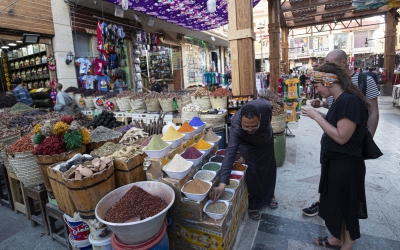Egypt to stop exporting wheat and other staples for three months

Egypt's Ministry of Trade and Industry has issued a decree suspending the export of gravel and mixed beans, lentils, wheat, flour of all kinds, and pasta for three months from 11 March, according to a copy of the document obtained by the Masrawy news portal.
Egypt, the world’s top wheat importer, is witnessing a dramatic rise in the price of unsubsidised bread and other staples, following Russia’s invasion of Ukraine.
New MEE newsletter: Jerusalem Dispatch
Sign up to get the latest insights and analysis on Israel-Palestine, alongside Turkey Unpacked and other MEE newsletters
The country is one of several Middle Eastern countries, including Iraq, Lebanon, Tunisia, Algeria and Turkey, that import wheat from the two countries.
The price rises helped Egypt's inflation rate hit 10 percent in February, official figures showed on Thursday.
"The annual headline inflation rate recorded 10 percent for February 2022, compared to 4.9 for the same month last year," the Central Agency for Public Mobilisation and Statistics (Capmas) said in a statement.
Capmas attributed the latest hike to a surge in prices of food, especially vegetables, bread and grain.
Hazem al-Manoufi, a member of the general food division at the Egyptian Chambers of Commerce, said on Thursday that the ministry's decision to stop exporting the staple goods would help lower prices.
Manoufi also called on the government to tighten control over those he described as "monopolists" who control the prices of goods.
Soaring bread prices
Between 2020 and 2021, Egypt imported most of its wheat - 12.5 million tonnes - from Russia and Ukraine.
On Monday, Khaled Sabri, a member of the bakeries division at Egypt’s Chambers of Commerce, told Bloomberg that a pack of five flat-bread loaves can now sell for about 7.5 Egyptian pounds ($0.48) in the greater Cairo area, up from five pounds a week ago.
The current price of subsidised bread is five Egyptian pounds ($0.32), with Prime Minister Mostafa Madbouly saying last month that an increase in the price of a loaf of subsidised bread "will certainly happen".
Nearly five years ago, angry demonstrations erupted across Egypt after the government cut bread subsidies amid an economic crisis.
On Wednesday, Egypt's Prime Minister Mostafa Madbouly said during a news conference that the country held a balance of wheat reserves that was sufficient for four months.
Madbouly said as of mid-April, the wheat harvest season will begin, assuring Egyptians, "that we, as a country, have no need or resort to the global market until the end of this year".
"We will not buy any shipments because we have a sufficient balance of wheat until the end of 2022," he added.
Food price rises
Last week, the global food price index reached an all-time high, soaring 24.1 percent above its level the year before, according to the UN's Food and Agriculture Organisation (FAO).
Egypt currently purchases a tonne of wheat at $400, up from $250 last year, with soaring insurance and freight costs adding to the effects of the war.
The FAO noted that with Russia and Ukraine providing some 29 percent of the global wheat trade, serious disruptions in production and exports could send food prices - already at 10-year highs - even higher.
Egypt has undertaken tough austerity measures including slashing subsidies and floating the local currency in 2016 as part of IMF-backed economic reforms.
Poor and middle-class Egyptians have been especially hit by the tough measures which saw inflation peak to 34 percent in 2017.
Middle East Eye delivers independent and unrivalled coverage and analysis of the Middle East, North Africa and beyond. To learn more about republishing this content and the associated fees, please fill out this form. More about MEE can be found here.





